专题01 语法(含解析)-2024-2025学年小学英语六年级上册期末专项练习(外研版三起)
文档属性
| 名称 | 专题01 语法(含解析)-2024-2025学年小学英语六年级上册期末专项练习(外研版三起) | 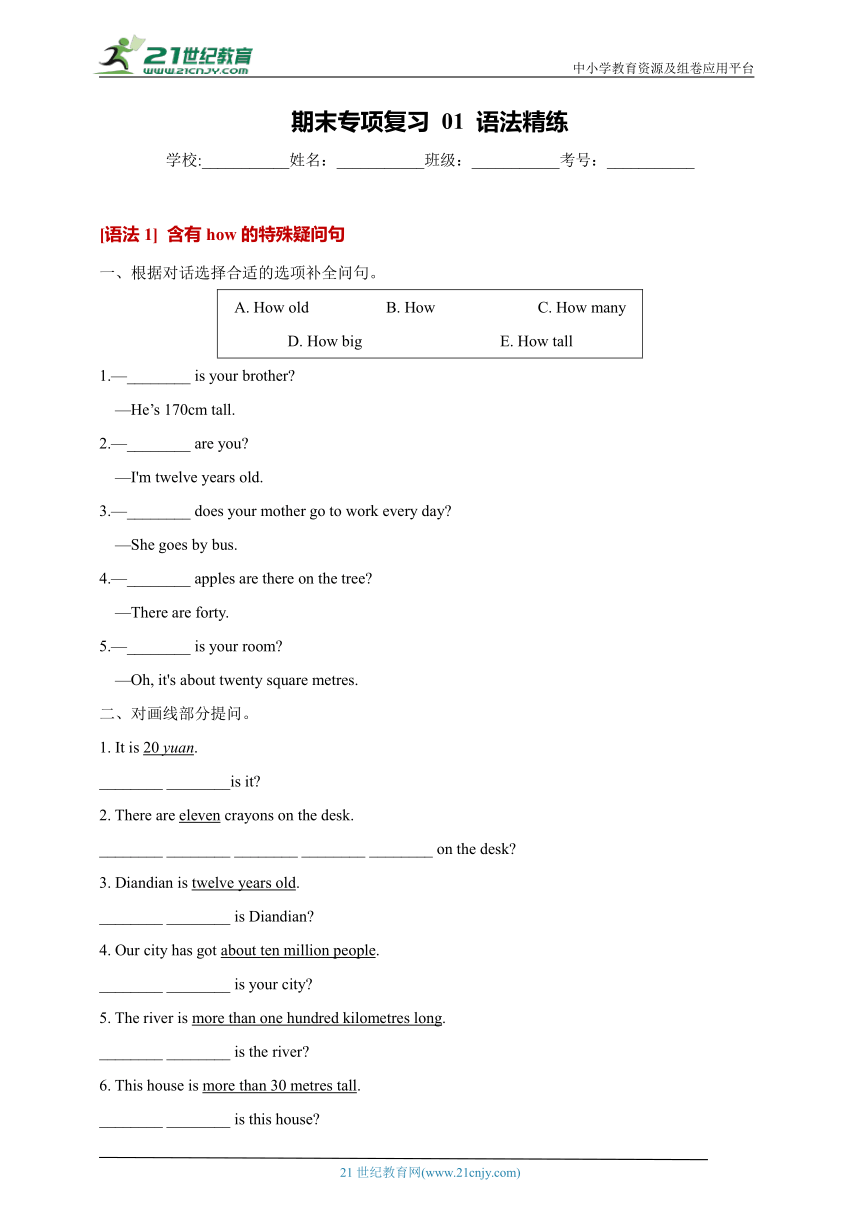 | |
| 格式 | docx | ||
| 文件大小 | 423.1KB | ||
| 资源类型 | 试卷 | ||
| 版本资源 | 外研版(三年级起点) | ||
| 科目 | 英语 | ||
| 更新时间 | 2024-12-12 23:03:01 | ||
图片预览

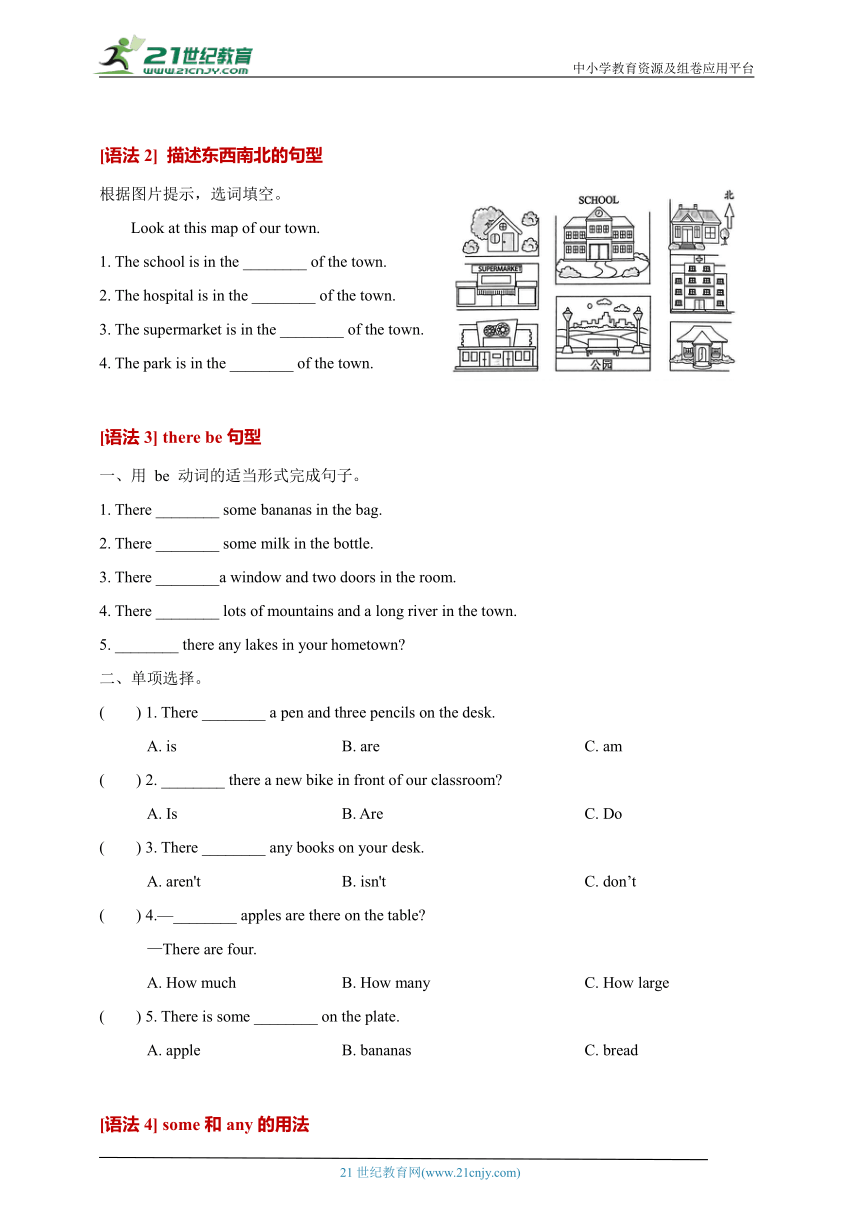
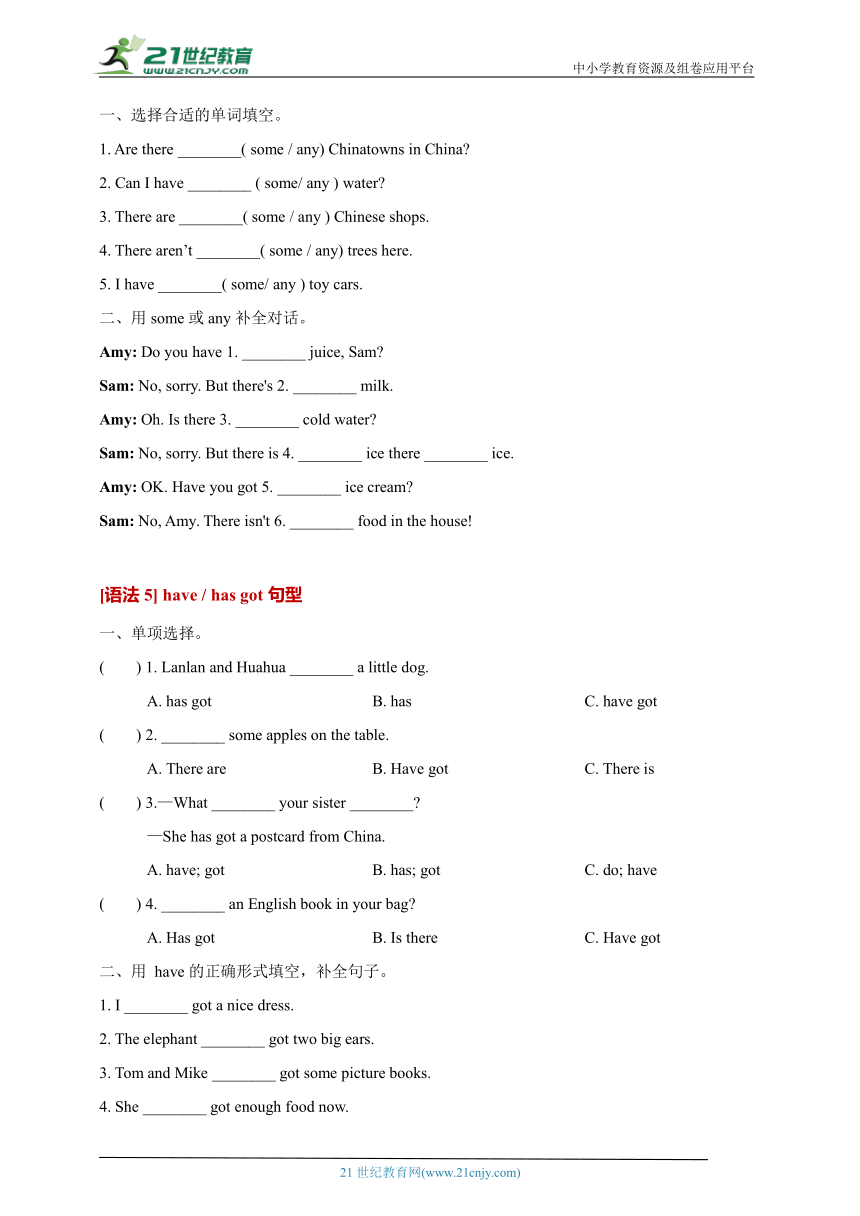
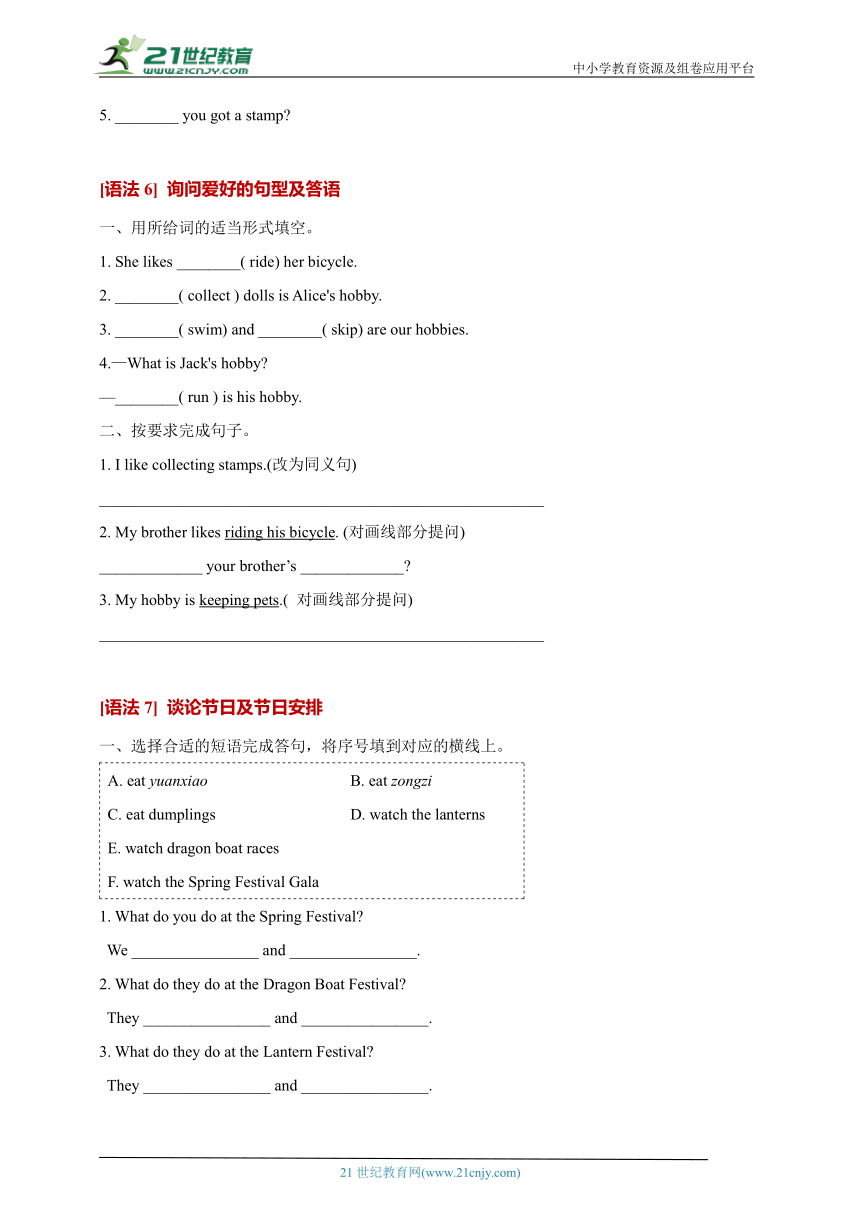
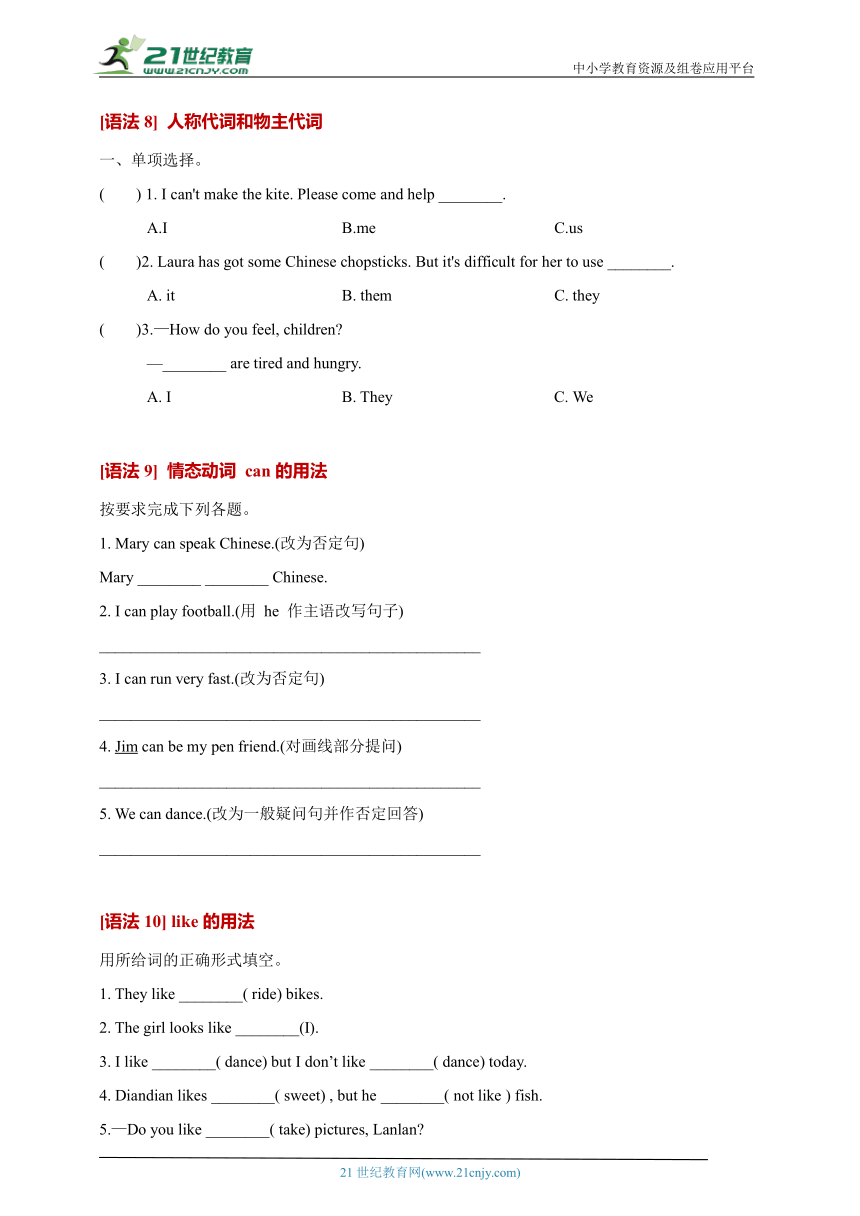
文档简介
中小学教育资源及组卷应用平台
期末专项复习 01 语法精练
学校:___________姓名:___________班级:___________考号:___________
[语法1] 含有how的特殊疑问句
一、根据对话选择合适的选项补全问句。
A. How old B. How C. How many D. How big E. How tall
1.—________ is your brother
—He’s 170cm tall.
2.—________ are you
—I'm twelve years old.
3.—________ does your mother go to work every day
—She goes by bus.
4.—________ apples are there on the tree
—There are forty.
5.—________ is your room
—Oh, it's about twenty square metres.
二、对画线部分提问。
1. It is 20 yuan.
________ ________is it
2. There are eleven crayons on the desk.
________ ________ ________ ________ ________ on the desk
3. Diandian is twelve years old.
________ ________ is Diandian
4. Our city has got about ten million people.
________ ________ is your city
5. The river is more than one hundred kilometres long.
________ ________ is the river
6. This house is more than 30 metres tall.
________ ________ is this house
[语法2] 描述东西南北的句型
根据图片提示,选词填空。
Look at this map of our town.
1. The school is in the ________ of the town.
2. The hospital is in the ________ of the town.
3. The supermarket is in the ________ of the town.
4. The park is in the ________ of the town.
[语法3] there be句型
一、用 be 动词的适当形式完成句子。
1. There ________ some bananas in the bag.
2. There ________ some milk in the bottle.
3. There ________a window and two doors in the room.
4. There ________ lots of mountains and a long river in the town.
5. ________ there any lakes in your hometown
二、单项选择。
( ) 1. There ________ a pen and three pencils on the desk.
A. is B. are C. am
( ) 2. ________ there a new bike in front of our classroom
A. Is B. Are C. Do
( ) 3. There ________ any books on your desk.
A. aren't B. isn't C. don’t
( ) 4.—________ apples are there on the table
—There are four.
A. How much B. How many C. How large
( ) 5. There is some ________ on the plate.
A. apple B. bananas C. bread
[语法4] some和any的用法
一、选择合适的单词填空。
1. Are there ________( some / any) Chinatowns in China
2. Can I have ________ ( some/ any ) water
3. There are ________( some / any ) Chinese shops.
4. There aren’t ________( some / any) trees here.
5. I have ________( some/ any ) toy cars.
二、用some或any补全对话。
Amy: Do you have 1. ________ juice, Sam
Sam: No, sorry. But there's 2. ________ milk.
Amy: Oh. Is there 3. ________ cold water
Sam: No, sorry. But there is 4. ________ ice there ________ ice.
Amy: OK. Have you got 5. ________ ice cream
Sam: No, Amy. There isn't 6. ________ food in the house!
[语法5] have / has got句型
一、单项选择。
( ) 1. Lanlan and Huahua ________ a little dog.
A. has got B. has C. have got
( ) 2. ________ some apples on the table.
A. There are B. Have got C. There is
( ) 3.—What ________ your sister ________
—She has got a postcard from China.
A. have; got B. has; got C. do; have
( ) 4. ________ an English book in your bag
A. Has got B. Is there C. Have got
二、用 have的正确形式填空,补全句子。
1. I ________ got a nice dress.
2. The elephant ________ got two big ears.
3. Tom and Mike ________ got some picture books.
4. She ________ got enough food now.
5. ________ you got a stamp
[语法6] 询问爱好的句型及答语
一、用所给词的适当形式填空。
1. She likes ________( ride) her bicycle.
2. ________( collect ) dolls is Alice's hobby.
3. ________( swim) and ________( skip) are our hobbies.
4.—What is Jack's hobby
—________( run ) is his hobby.
二、按要求完成句子。
1. I like collecting stamps.(改为同义句)
________________________________________________________
2. My brother likes riding his bicycle. (对画线部分提问)
_____________ your brother’s _____________
3. My hobby is keeping pets.( 对画线部分提问)
________________________________________________________
[语法7] 谈论节日及节日安排
一、选择合适的短语完成答句,将序号填到对应的横线上。
A. eat yuanxiao B. eat zongzi C. eat dumplings D. watch the lanterns E. watch dragon boat races F. watch the Spring Festival Gala
1. What do you do at the Spring Festival
We ________________ and ________________.
2. What do they do at the Dragon Boat Festival
They ________________ and ________________.
3. What do they do at the Lantern Festival
They ________________ and ________________.
[语法8] 人称代词和物主代词
一、单项选择。
( ) 1. I can't make the kite. Please come and help ________.
A.I B.me C.us
( )2. Laura has got some Chinese chopsticks. But it's difficult for her to use ________.
A. it B. them C. they
( )3.—How do you feel, children
—________ are tired and hungry.
A. I B. They C. We
[语法9] 情态动词 can的用法
按要求完成下列各题。
1. Mary can speak Chinese.(改为否定句)
Mary ________ ________ Chinese.
2. I can play football.(用 he 作主语改写句子)
________________________________________________
3. I can run very fast.(改为否定句)
________________________________________________
4. Jim can be my pen friend.(对画线部分提问)
________________________________________________
5. We can dance.(改为一般疑问句并作否定回答)
________________________________________________
[语法10] like的用法
用所给词的正确形式填空。
1. They like ________( ride) bikes.
2. The girl looks like ________(I).
3. I like ________( dance) but I don’t like ________( dance) today.
4. Diandian likes ________( sweet) , but he ________( not like ) fish.
5.—Do you like ________( take) pictures, Lanlan
—No,I don’t. I like ________( swim).
[语法11] and和 but的用法
用 but或 and填空, 补全句子。
1. Look at that woman. She is beautiful ________ smart.
2. Jane could draw well in 2012, ________ now she can't.
3. She likes Chinese very much, ________ she can't speak Chinese well.
4. My mum buys a new skirt for me ________I'm so happy.
5.—Anna, what a nice dress you are wearing today!
—Thank you. It fits me well, ________ the colour is not my favourite.
[语法12] 选择疑问句
一、单项选择。
( )1.—Are these dishes wet or dry
—________.
A. Yes, they are B. No, they are dirty C. They are dry
( ) 2.—Is it a pear ________a peach
—It's a peach, I think.
A. or B. and C. of
( ) 3.—Does she teach English or Chinese
—________
A. She teaches Chinese. B. Yes, she does. C. She's a teacher.
二、按要求完成句子。
1. She enjoys fast music.(用 slow music 改为选择疑问句)
________ she ________ fast music ________ slow music
2. Does he have long hair Does he have short hair (合并为一句)
________ he have long hair ________ short hair
3. I like this shirt. I like that shirt.(变为选择疑问句)
________________________________________________
[语法13] 一般现在时
用所给词的适当形式填空。
1. Sarah ________( wash) her clothes every day.
2. I like singing. I ________( listen) to music in the evening.
3. There ________( be ) some water in the glass.
4. My grandparents ________ ( watch) TV every night.
5. The twins ________ ( go) home at five o’clock.
[语法14] 感叹句
一、用 what或 how填空。
1. ________________ an interesting story!
2. ________________ cute the rabbit is!
3. ________________a big library!
4. ________________ beautiful a cat it is!
5. ________________ cold weather it is!
二、改为感叹句。
1. It is a fantastic programme.
________ ________ fantastic programme it is!
2. She is a beautiful girl.
________ ________ beautiful girl she is!
3. The girls are dancing well.
________ ________ the girls are dancing!
[语法15] 频度副词的用法
单项选择。
( ) 1. She ________ arrives at school late, so the teacher praises(表扬) her.
A. never B. sometimes C. often
( ) 2. He is a good boy. He ________ listens to his teachers carefully.
A. never B. sometimes C. always
( ) 3. Liu Tao likes playing computer games. But he ________ play(s) them because it's bad for his eyes.
A. always B. doesn't always C. always doesn't
( ) 4. I ________ read some books before dinner, but ________I read them after dinner.
A. often; always B. always; sometimes C. often; never
[语法16] 一般现在时、现在进行时和一般过去时的用法比较
一、用所给词的适当形式填空。
1. I________ ( go) to school by bus every day.
2. Su Yang ________( read) English last night.
3. You ________( have) a pen and she ________( have) a pencil.
4.—What are you doing
—I’m ________( stop) my car.
5.—What does she ________( like ) doing
—She ________( like)________( take) photos.
6. It's time for lunch. Judy ________( have)a hamburger and some cola.
7. Sandy ________( be ) five years old ten years ago. Now she ________( be ) fifteen years old.
8.—Did you ________( play) football yesterday afternoon
—Yes,I________( do).
9.—________( be ) they at home last week
—No, they ________( be not).
10.—Is Jessica ________( wash ) the clothes
—Yes, she is.
[语法17] want的用法
用所给词的适当形式补全句子或对话。
1. Mike ________( want) to visit the Changjiang River.
2.—What do you ________( want)
—I________( want) some bread.
3. She wants ________( go) to Guilin.
4. I want ________( show) you my new dress.
5. The doctor wants to ________( take) a photo of my teeth.
6. I________( not want) to go inside.
7. My brothers ________( want) to buy a map of China.
8. My parents want ________(I) to get good grades.
[语法18] 祈使句
用所给词的适当形式填空。
1. Let’s ________( play) basketball tomorrow.
2. ________________ ( not talk ) in the classroom.
3. Please ________( open) the window.
4. Tom,________( not be ) late for school again.
5. There's a sign“ No ________( smoke)” here. Please don’t ________( smoke ).
[语法19] 常见的警示标识
根据所给图片,从括号内选词填空,完成句子。
1. No ________( running/ swimming).
2. No ________( drinking/ photos).
3. No ________( smoking/ fishing).
4. ________( Go/ Stop)! It's green now.
5. ________( No/ Not) parking.
参考答案
[语法1]
一、1. E 解析:根据答语为“He's 170cm tall.” 二可知问句是询问身高, 故用How tall。
2. A 解析:根据答语为“I'm twelve years old.”可知问句是询问年龄, 故用How old。
3. B 解析:根据答语为“She goes by bus.”可知问句是询问交通方式,故用How。
4. C 解析:根据答语为“There are forty.”可知问句是询问可数名词的数量, 故用How many。
5. D 解析:根据答语为“Oh, it's about twenty square metres.”可知问句是询问房间大小, 故用How big。
二、1. How much 解析:根据画线部分是“20yuan”,可知要提问价格, 故用How much 询问价格。
2. How many crayons are there 解析:根据画线部分是 eleven 可知是对可数名词的数量提问,故用How many 提问。
3. How old 解析:根据画线部分是 twelve years old 可知是询问年龄, 故用How old。
4. How big 解析:根据画线部分是 about ten million people 可知是提问人口数量, 故用 How big。
5. How long 解析:根据画线部分是 more than one hundred kilometres long 可知是提问长度, 故用 How long。
6. How tall 解析:根据画线部分是 more than 30metres tall 可知是提问高度, 故用 How tall。
[语法2]
1. north 2. east 3. west 4. south
[语法3]
一、1. are 解析: bananas为可数名词复数, 故用 are。
2. is 解析: milk为不可数名词, 故用 is。
3. is 解析: there be 句型遵循就近原则, 离 be 动词近的是可数名词单数 window, 故用 is。
4. are 解析: there be 句型遵循就近原则, 离 be 动词近的是复数 mountains, 故用 are。
5. Are 解析:此句为 there be 句型的一般疑问句, be 动词提前, 根据复数 lakes 可知用 Are there提问。
二、1. A 2. A
3. A 解析:根据就近原则, books为复数, 故用 are, 且句中有 any, 用其否定形式 aren't。
4. B 解析:根据问句中的 apples 为可数名词复数以及答句, 可知是问桌子上有几个苹果, 故用 How many 提问。
5. C 解析:根据句中的 There is some 可知后面是不可数名词, 故选 C。
[语法4]
一、1. any 解析: some 和 any 都表示“一些”, any 用于一般疑问句和否定句, 此句为一般疑问句, 用 any。
2. some 解析: some 一般用于肯定句或期望得到肯定回答的一般疑问句。此句期望肯定回答,用 some。
3. some 解析:此句为肯定句, 故用 some修饰 Chinese shops。
4. any 解析:此句为否定句, 故用 any 修饰 trees。
5. some 解析:此句为肯定句, 故用 some修饰 toy cars。
二、1. any 解析:根据 Do you have 可知此句为一般疑问句, 用 any。
2. some 解析:肯定句用 some。
3. any 解析:根据 Is there 可知此句为一般疑问句, 用 any。
4. some 解析:根据 there is 可知此句为肯定句, 用 some。
5. any 解析:此句为询问某人是否有某物的疑问句, 用 any。
6. any 解析:根据 isn't 可知此句为否定句, 用 any。
[语法5]
一、1. C 解析:根据主语是 Lanlan and Huahua, 两个人,可知选C。
2. A 解析:根据横线后是可数名词复数 some apples,可知要用 there are 表示客观存在,故选A。
3. B解析:根据问句主语是第三人称单数,可知选B。
4. B
二、1. have 解析:此题主语是I, 故用 have got 表达“有,拥有”。
2. has 解析:此题主语 The elephant 是第三人称单数, 用 has got 表达“有, 拥有”。
3. have 解析:此题句子主语是 Tom and Mike, 相当于复数, 故用 have got表达“有, 拥有”。
4. has解析:此题句子主语是第三人称单数 She, 故用 has got 表达“有, 拥有”。
5. Have 解析:此题句子主语是 you, 故用 have got表达“有, 拥有”。
[语法6]
一、1. riding 解析: like + doing表示喜好, ride 的- ing 形式是 riding。
2. Collecting 解析:句子少主语, 动名词作主语, collect 的- ing 形式是 collecting, 句子开头要大写。
3. Swimming; skipping 解析:句子少主语, 动名词作主语, swim的- ing 形式是 swimming,句子开头要大写, skip的- ing 形式是 skipping。
4. Running 解析:句子少主语, 动名词作主语, run 的- ing 形式是 running, 句子开头要大写。
二、1. My hobby is collecting stamps./Collecting stamps is my hobby.
解析:表达爱好除了I like +动名词.,还可以用句型: My hobby is +动名词.; 动名词+ is my hobby.。
2. What’s; hobby 解析:询问某人有什么爱好可以用 what提问。句型是 What's +某人的+ hobby 。
3. What's your hobby 解析:询问对方的爱好是什么用 What's your hobby 。
[语法7]
一、1. C;F 2. B;E 3. A;D
[语法8]
一、1. B 解析:此处缺少 help的宾语, 故应该用人称代词宾格,根据前一句主语是I,可知此句意为“请来帮我一下。”,要用 me,故选B。
2. B 解析:此处缺少的是 use的宾语,故应该用人称代词宾格,根据前一句可知这里代指的应该是 chopsticks,故用第三人称复数的宾格 them, 故选 B。
3. C解析:此处缺少的是主语,故应该用人称代词主格,根据问句可知询问的是孩子们,故答语主语应该用 We,故选 C。
[语法9]
一、1. can't speak 2. He can play football.
3. I can't run very fast.
4. Who can be your pen friend
5.—Can you dance —No, we can't.
[语法10]
一、1. riding 解析: like 后接 doing, ride的- ing 形式是 riding。
2.me 解析:looks like表示“看起来像”,句子少宾语,故用宾格 me。
3. dancing; to dance 解析:前面用 like doing结构表示“我喜欢跳舞”,but表示转折,可知后面要说“但是我今天不想跳舞”,故用 like to do结构。
4. sweets; doesn't like 解析: like +名词表示喜欢某物,应用可数名词复数,故sweet变成复数形式 sweets, but表示转折, like的否定形式是 don't like, 第三人称单数形式是 doesn't like。
5. taking; swimming 解析:like后加 doing, take 的- ing形式是 taking, swim的- ing 形式是 swimming。
[语法11]
1. and 2. but 3. but 4. and 5. but
解析:该题通过句意推断所连接内容之间的关系,若是并列关系则用 and连接,若是转折关系则用 but连接。
[语法12]
一、1. C解析:选择疑问句的答语不需要回答 Yes 或 No, 故选 C。
2. A解析:选择疑问句中的两个选项之间要用 or连接, 故选 A。
3. A
二、1. Does; enjoy; or 解析:首先把陈述句改为一般疑问句, 主语是 She, 用 Does提问, 其后动词用原形,两个选项之间要用 or连接。
2. Does;or 解析:选择疑问句中的两个选项之间要用 or连接。
3. Do you like this shirt or that shirt 解析:根据句意可知要在 this shirt 和 that shirt 中进行选择, 两个选项之间用 or连接,I是第一人称,变一般疑问句要用 Do 引导,第一人称变为第二人称 you。
[语法13]
1. washes 解析:Sarah 是第三人称单数, 其后动词用第三人称单数形式,故填 washes。
2. listen 解析:I是第一人称, 其后动词用原形, 故填 listen。
3. is 解析:water是不可数名词, be动词用单数, 故填 is。
4. watch 5. go
[语法14]
一、1. What 2. How 3. What 4. How 5. What
解析:What引导的感叹句结构为“ What +a/ an+形容词+可数名词单数+主语+谓语!”和“ What+形容词+可数名词复数/不可数名词+主语+谓语!”; How引导的感叹句结构为“ How+形容词/副词+主语+谓语!”。
二、1. What a 2. What a
解析:根据结构可知这是由 What引导的感叹句,且名词为可数名词单数,What后要加冠词a。
3. How well 解析:根据结构可知要强调的是副词 well, 要用 How 引导, 故填 How well。He goes to bed at nine o’ clock.
[语法15]
1. A解析:根据后半句句意“所以老师表扬她”可推测“她”从不迟到,故选 A。
2. C解析:根据前句句意“他是一个好男孩”可推测他总是仔细听老师的话,故选C。
3. B解析:频度副词要放在助动词后,行为动词前,故选 B。
4. B
[语法16]
1. go 解析:由 every day可知本句话时态是一般现在时,主语I是第一人称,其后动词用原形, 故填 go。
2. read 解析:由 last night可知本句话时态是一般过去时,动词要用过去式,故填 read。
3. have; has 解析:you是第二人称, 其后动词用原形,故一空填 have;she是第三人称单数,其后动词用第三人称单数形式,故二空填 has。
4. stopping 解析:由问句结构可知时态为现在进行时,问答句时态必须保持一致,故答语的谓语部分结构为 be doing, 故填 stopping。
5. like; likes; taking 解析:由 does可知时态为一般现在时,助动词 does后动词用原形,故一空填 like;she 是第三人称单数,其后动词用第三人称单数形式, 故二空填 likes; 又因 like doing是固定结构“喜欢做……”,故三空填 taking。
6. is having 解析:由“ It's time for lunch.”可知第二句话用现在进行时,动词要用 be doing的结构, 故填 is having。
7. was; is 解析:由“ ten years ago”可知前句时态为一般过去时,be动词要用过去式,故一空填 was;而由后句的“ Now”可知后句时态为一般现在时,故二空填 is。
8. play; did 解析:Did 是助动词, 其后动词用原形,Did开头的一般疑问句要用 did 回答,其肯定回答为“ Yes,主语+ did.”。
9. Were; weren’t 解析:由“ last week”可知本句时态为一般过去时,be动词要用过去式,they是人称复数,故用 Were,其否定回答为“ No,主语+ weren't.”。
10. washing 解析:由“ Is”可推断该句时态为现在进行时,谓语部分用 be doing表示,故填 washing。
[语法17]
1. wants 解析:主语是第三人称单数,其后动词用第三人称单数形式。
2. want; want 解析:主语是第一、第二人称时, 其后用动词原形。
3. to go 解析:want to do sth.意为“想做某事”。
4. to show 解析:由固定搭配 want to do sth.可知该题答案。
5. take 解析:由固定搭配 want to do sth.可知该题答案。
6. don’t want
7. want 解析:主语 My brothers 是复数, 谓语动词用原形。
8.me 解析:want是动词,其后人称代词用宾格形式, 故填 me。
[语法18]
1. play 解析:Let's 后接动词原形。
2. Don’t talk 解析:否定祈使句用“ Don’t +动词原形”开头。
3. open 解析:分析句子结构可知是祈使句,动词要用原形,故填 open。
4. don’t be 解析:否定祈使句用 Don’t +动词原形开头。
5. smoking; smoke 解析:“ No+名词/动名词”表示禁止做某事,don't 后加动词原形。
[语法19]
1. swimming 2. photos 3. fishing 4. Go 5. No
21世纪教育网 www.21cnjy.com 精品试卷·第 2 页 (共 2 页)
21世纪教育网(www.21cnjy.com)
期末专项复习 01 语法精练
学校:___________姓名:___________班级:___________考号:___________
[语法1] 含有how的特殊疑问句
一、根据对话选择合适的选项补全问句。
A. How old B. How C. How many D. How big E. How tall
1.—________ is your brother
—He’s 170cm tall.
2.—________ are you
—I'm twelve years old.
3.—________ does your mother go to work every day
—She goes by bus.
4.—________ apples are there on the tree
—There are forty.
5.—________ is your room
—Oh, it's about twenty square metres.
二、对画线部分提问。
1. It is 20 yuan.
________ ________is it
2. There are eleven crayons on the desk.
________ ________ ________ ________ ________ on the desk
3. Diandian is twelve years old.
________ ________ is Diandian
4. Our city has got about ten million people.
________ ________ is your city
5. The river is more than one hundred kilometres long.
________ ________ is the river
6. This house is more than 30 metres tall.
________ ________ is this house
[语法2] 描述东西南北的句型
根据图片提示,选词填空。
Look at this map of our town.
1. The school is in the ________ of the town.
2. The hospital is in the ________ of the town.
3. The supermarket is in the ________ of the town.
4. The park is in the ________ of the town.
[语法3] there be句型
一、用 be 动词的适当形式完成句子。
1. There ________ some bananas in the bag.
2. There ________ some milk in the bottle.
3. There ________a window and two doors in the room.
4. There ________ lots of mountains and a long river in the town.
5. ________ there any lakes in your hometown
二、单项选择。
( ) 1. There ________ a pen and three pencils on the desk.
A. is B. are C. am
( ) 2. ________ there a new bike in front of our classroom
A. Is B. Are C. Do
( ) 3. There ________ any books on your desk.
A. aren't B. isn't C. don’t
( ) 4.—________ apples are there on the table
—There are four.
A. How much B. How many C. How large
( ) 5. There is some ________ on the plate.
A. apple B. bananas C. bread
[语法4] some和any的用法
一、选择合适的单词填空。
1. Are there ________( some / any) Chinatowns in China
2. Can I have ________ ( some/ any ) water
3. There are ________( some / any ) Chinese shops.
4. There aren’t ________( some / any) trees here.
5. I have ________( some/ any ) toy cars.
二、用some或any补全对话。
Amy: Do you have 1. ________ juice, Sam
Sam: No, sorry. But there's 2. ________ milk.
Amy: Oh. Is there 3. ________ cold water
Sam: No, sorry. But there is 4. ________ ice there ________ ice.
Amy: OK. Have you got 5. ________ ice cream
Sam: No, Amy. There isn't 6. ________ food in the house!
[语法5] have / has got句型
一、单项选择。
( ) 1. Lanlan and Huahua ________ a little dog.
A. has got B. has C. have got
( ) 2. ________ some apples on the table.
A. There are B. Have got C. There is
( ) 3.—What ________ your sister ________
—She has got a postcard from China.
A. have; got B. has; got C. do; have
( ) 4. ________ an English book in your bag
A. Has got B. Is there C. Have got
二、用 have的正确形式填空,补全句子。
1. I ________ got a nice dress.
2. The elephant ________ got two big ears.
3. Tom and Mike ________ got some picture books.
4. She ________ got enough food now.
5. ________ you got a stamp
[语法6] 询问爱好的句型及答语
一、用所给词的适当形式填空。
1. She likes ________( ride) her bicycle.
2. ________( collect ) dolls is Alice's hobby.
3. ________( swim) and ________( skip) are our hobbies.
4.—What is Jack's hobby
—________( run ) is his hobby.
二、按要求完成句子。
1. I like collecting stamps.(改为同义句)
________________________________________________________
2. My brother likes riding his bicycle. (对画线部分提问)
_____________ your brother’s _____________
3. My hobby is keeping pets.( 对画线部分提问)
________________________________________________________
[语法7] 谈论节日及节日安排
一、选择合适的短语完成答句,将序号填到对应的横线上。
A. eat yuanxiao B. eat zongzi C. eat dumplings D. watch the lanterns E. watch dragon boat races F. watch the Spring Festival Gala
1. What do you do at the Spring Festival
We ________________ and ________________.
2. What do they do at the Dragon Boat Festival
They ________________ and ________________.
3. What do they do at the Lantern Festival
They ________________ and ________________.
[语法8] 人称代词和物主代词
一、单项选择。
( ) 1. I can't make the kite. Please come and help ________.
A.I B.me C.us
( )2. Laura has got some Chinese chopsticks. But it's difficult for her to use ________.
A. it B. them C. they
( )3.—How do you feel, children
—________ are tired and hungry.
A. I B. They C. We
[语法9] 情态动词 can的用法
按要求完成下列各题。
1. Mary can speak Chinese.(改为否定句)
Mary ________ ________ Chinese.
2. I can play football.(用 he 作主语改写句子)
________________________________________________
3. I can run very fast.(改为否定句)
________________________________________________
4. Jim can be my pen friend.(对画线部分提问)
________________________________________________
5. We can dance.(改为一般疑问句并作否定回答)
________________________________________________
[语法10] like的用法
用所给词的正确形式填空。
1. They like ________( ride) bikes.
2. The girl looks like ________(I).
3. I like ________( dance) but I don’t like ________( dance) today.
4. Diandian likes ________( sweet) , but he ________( not like ) fish.
5.—Do you like ________( take) pictures, Lanlan
—No,I don’t. I like ________( swim).
[语法11] and和 but的用法
用 but或 and填空, 补全句子。
1. Look at that woman. She is beautiful ________ smart.
2. Jane could draw well in 2012, ________ now she can't.
3. She likes Chinese very much, ________ she can't speak Chinese well.
4. My mum buys a new skirt for me ________I'm so happy.
5.—Anna, what a nice dress you are wearing today!
—Thank you. It fits me well, ________ the colour is not my favourite.
[语法12] 选择疑问句
一、单项选择。
( )1.—Are these dishes wet or dry
—________.
A. Yes, they are B. No, they are dirty C. They are dry
( ) 2.—Is it a pear ________a peach
—It's a peach, I think.
A. or B. and C. of
( ) 3.—Does she teach English or Chinese
—________
A. She teaches Chinese. B. Yes, she does. C. She's a teacher.
二、按要求完成句子。
1. She enjoys fast music.(用 slow music 改为选择疑问句)
________ she ________ fast music ________ slow music
2. Does he have long hair Does he have short hair (合并为一句)
________ he have long hair ________ short hair
3. I like this shirt. I like that shirt.(变为选择疑问句)
________________________________________________
[语法13] 一般现在时
用所给词的适当形式填空。
1. Sarah ________( wash) her clothes every day.
2. I like singing. I ________( listen) to music in the evening.
3. There ________( be ) some water in the glass.
4. My grandparents ________ ( watch) TV every night.
5. The twins ________ ( go) home at five o’clock.
[语法14] 感叹句
一、用 what或 how填空。
1. ________________ an interesting story!
2. ________________ cute the rabbit is!
3. ________________a big library!
4. ________________ beautiful a cat it is!
5. ________________ cold weather it is!
二、改为感叹句。
1. It is a fantastic programme.
________ ________ fantastic programme it is!
2. She is a beautiful girl.
________ ________ beautiful girl she is!
3. The girls are dancing well.
________ ________ the girls are dancing!
[语法15] 频度副词的用法
单项选择。
( ) 1. She ________ arrives at school late, so the teacher praises(表扬) her.
A. never B. sometimes C. often
( ) 2. He is a good boy. He ________ listens to his teachers carefully.
A. never B. sometimes C. always
( ) 3. Liu Tao likes playing computer games. But he ________ play(s) them because it's bad for his eyes.
A. always B. doesn't always C. always doesn't
( ) 4. I ________ read some books before dinner, but ________I read them after dinner.
A. often; always B. always; sometimes C. often; never
[语法16] 一般现在时、现在进行时和一般过去时的用法比较
一、用所给词的适当形式填空。
1. I________ ( go) to school by bus every day.
2. Su Yang ________( read) English last night.
3. You ________( have) a pen and she ________( have) a pencil.
4.—What are you doing
—I’m ________( stop) my car.
5.—What does she ________( like ) doing
—She ________( like)________( take) photos.
6. It's time for lunch. Judy ________( have)a hamburger and some cola.
7. Sandy ________( be ) five years old ten years ago. Now she ________( be ) fifteen years old.
8.—Did you ________( play) football yesterday afternoon
—Yes,I________( do).
9.—________( be ) they at home last week
—No, they ________( be not).
10.—Is Jessica ________( wash ) the clothes
—Yes, she is.
[语法17] want的用法
用所给词的适当形式补全句子或对话。
1. Mike ________( want) to visit the Changjiang River.
2.—What do you ________( want)
—I________( want) some bread.
3. She wants ________( go) to Guilin.
4. I want ________( show) you my new dress.
5. The doctor wants to ________( take) a photo of my teeth.
6. I________( not want) to go inside.
7. My brothers ________( want) to buy a map of China.
8. My parents want ________(I) to get good grades.
[语法18] 祈使句
用所给词的适当形式填空。
1. Let’s ________( play) basketball tomorrow.
2. ________________ ( not talk ) in the classroom.
3. Please ________( open) the window.
4. Tom,________( not be ) late for school again.
5. There's a sign“ No ________( smoke)” here. Please don’t ________( smoke ).
[语法19] 常见的警示标识
根据所给图片,从括号内选词填空,完成句子。
1. No ________( running/ swimming).
2. No ________( drinking/ photos).
3. No ________( smoking/ fishing).
4. ________( Go/ Stop)! It's green now.
5. ________( No/ Not) parking.
参考答案
[语法1]
一、1. E 解析:根据答语为“He's 170cm tall.” 二可知问句是询问身高, 故用How tall。
2. A 解析:根据答语为“I'm twelve years old.”可知问句是询问年龄, 故用How old。
3. B 解析:根据答语为“She goes by bus.”可知问句是询问交通方式,故用How。
4. C 解析:根据答语为“There are forty.”可知问句是询问可数名词的数量, 故用How many。
5. D 解析:根据答语为“Oh, it's about twenty square metres.”可知问句是询问房间大小, 故用How big。
二、1. How much 解析:根据画线部分是“20yuan”,可知要提问价格, 故用How much 询问价格。
2. How many crayons are there 解析:根据画线部分是 eleven 可知是对可数名词的数量提问,故用How many 提问。
3. How old 解析:根据画线部分是 twelve years old 可知是询问年龄, 故用How old。
4. How big 解析:根据画线部分是 about ten million people 可知是提问人口数量, 故用 How big。
5. How long 解析:根据画线部分是 more than one hundred kilometres long 可知是提问长度, 故用 How long。
6. How tall 解析:根据画线部分是 more than 30metres tall 可知是提问高度, 故用 How tall。
[语法2]
1. north 2. east 3. west 4. south
[语法3]
一、1. are 解析: bananas为可数名词复数, 故用 are。
2. is 解析: milk为不可数名词, 故用 is。
3. is 解析: there be 句型遵循就近原则, 离 be 动词近的是可数名词单数 window, 故用 is。
4. are 解析: there be 句型遵循就近原则, 离 be 动词近的是复数 mountains, 故用 are。
5. Are 解析:此句为 there be 句型的一般疑问句, be 动词提前, 根据复数 lakes 可知用 Are there提问。
二、1. A 2. A
3. A 解析:根据就近原则, books为复数, 故用 are, 且句中有 any, 用其否定形式 aren't。
4. B 解析:根据问句中的 apples 为可数名词复数以及答句, 可知是问桌子上有几个苹果, 故用 How many 提问。
5. C 解析:根据句中的 There is some 可知后面是不可数名词, 故选 C。
[语法4]
一、1. any 解析: some 和 any 都表示“一些”, any 用于一般疑问句和否定句, 此句为一般疑问句, 用 any。
2. some 解析: some 一般用于肯定句或期望得到肯定回答的一般疑问句。此句期望肯定回答,用 some。
3. some 解析:此句为肯定句, 故用 some修饰 Chinese shops。
4. any 解析:此句为否定句, 故用 any 修饰 trees。
5. some 解析:此句为肯定句, 故用 some修饰 toy cars。
二、1. any 解析:根据 Do you have 可知此句为一般疑问句, 用 any。
2. some 解析:肯定句用 some。
3. any 解析:根据 Is there 可知此句为一般疑问句, 用 any。
4. some 解析:根据 there is 可知此句为肯定句, 用 some。
5. any 解析:此句为询问某人是否有某物的疑问句, 用 any。
6. any 解析:根据 isn't 可知此句为否定句, 用 any。
[语法5]
一、1. C 解析:根据主语是 Lanlan and Huahua, 两个人,可知选C。
2. A 解析:根据横线后是可数名词复数 some apples,可知要用 there are 表示客观存在,故选A。
3. B解析:根据问句主语是第三人称单数,可知选B。
4. B
二、1. have 解析:此题主语是I, 故用 have got 表达“有,拥有”。
2. has 解析:此题主语 The elephant 是第三人称单数, 用 has got 表达“有, 拥有”。
3. have 解析:此题句子主语是 Tom and Mike, 相当于复数, 故用 have got表达“有, 拥有”。
4. has解析:此题句子主语是第三人称单数 She, 故用 has got 表达“有, 拥有”。
5. Have 解析:此题句子主语是 you, 故用 have got表达“有, 拥有”。
[语法6]
一、1. riding 解析: like + doing表示喜好, ride 的- ing 形式是 riding。
2. Collecting 解析:句子少主语, 动名词作主语, collect 的- ing 形式是 collecting, 句子开头要大写。
3. Swimming; skipping 解析:句子少主语, 动名词作主语, swim的- ing 形式是 swimming,句子开头要大写, skip的- ing 形式是 skipping。
4. Running 解析:句子少主语, 动名词作主语, run 的- ing 形式是 running, 句子开头要大写。
二、1. My hobby is collecting stamps./Collecting stamps is my hobby.
解析:表达爱好除了I like +动名词.,还可以用句型: My hobby is +动名词.; 动名词+ is my hobby.。
2. What’s; hobby 解析:询问某人有什么爱好可以用 what提问。句型是 What's +某人的+ hobby 。
3. What's your hobby 解析:询问对方的爱好是什么用 What's your hobby 。
[语法7]
一、1. C;F 2. B;E 3. A;D
[语法8]
一、1. B 解析:此处缺少 help的宾语, 故应该用人称代词宾格,根据前一句主语是I,可知此句意为“请来帮我一下。”,要用 me,故选B。
2. B 解析:此处缺少的是 use的宾语,故应该用人称代词宾格,根据前一句可知这里代指的应该是 chopsticks,故用第三人称复数的宾格 them, 故选 B。
3. C解析:此处缺少的是主语,故应该用人称代词主格,根据问句可知询问的是孩子们,故答语主语应该用 We,故选 C。
[语法9]
一、1. can't speak 2. He can play football.
3. I can't run very fast.
4. Who can be your pen friend
5.—Can you dance —No, we can't.
[语法10]
一、1. riding 解析: like 后接 doing, ride的- ing 形式是 riding。
2.me 解析:looks like表示“看起来像”,句子少宾语,故用宾格 me。
3. dancing; to dance 解析:前面用 like doing结构表示“我喜欢跳舞”,but表示转折,可知后面要说“但是我今天不想跳舞”,故用 like to do结构。
4. sweets; doesn't like 解析: like +名词表示喜欢某物,应用可数名词复数,故sweet变成复数形式 sweets, but表示转折, like的否定形式是 don't like, 第三人称单数形式是 doesn't like。
5. taking; swimming 解析:like后加 doing, take 的- ing形式是 taking, swim的- ing 形式是 swimming。
[语法11]
1. and 2. but 3. but 4. and 5. but
解析:该题通过句意推断所连接内容之间的关系,若是并列关系则用 and连接,若是转折关系则用 but连接。
[语法12]
一、1. C解析:选择疑问句的答语不需要回答 Yes 或 No, 故选 C。
2. A解析:选择疑问句中的两个选项之间要用 or连接, 故选 A。
3. A
二、1. Does; enjoy; or 解析:首先把陈述句改为一般疑问句, 主语是 She, 用 Does提问, 其后动词用原形,两个选项之间要用 or连接。
2. Does;or 解析:选择疑问句中的两个选项之间要用 or连接。
3. Do you like this shirt or that shirt 解析:根据句意可知要在 this shirt 和 that shirt 中进行选择, 两个选项之间用 or连接,I是第一人称,变一般疑问句要用 Do 引导,第一人称变为第二人称 you。
[语法13]
1. washes 解析:Sarah 是第三人称单数, 其后动词用第三人称单数形式,故填 washes。
2. listen 解析:I是第一人称, 其后动词用原形, 故填 listen。
3. is 解析:water是不可数名词, be动词用单数, 故填 is。
4. watch 5. go
[语法14]
一、1. What 2. How 3. What 4. How 5. What
解析:What引导的感叹句结构为“ What +a/ an+形容词+可数名词单数+主语+谓语!”和“ What+形容词+可数名词复数/不可数名词+主语+谓语!”; How引导的感叹句结构为“ How+形容词/副词+主语+谓语!”。
二、1. What a 2. What a
解析:根据结构可知这是由 What引导的感叹句,且名词为可数名词单数,What后要加冠词a。
3. How well 解析:根据结构可知要强调的是副词 well, 要用 How 引导, 故填 How well。He goes to bed at nine o’ clock.
[语法15]
1. A解析:根据后半句句意“所以老师表扬她”可推测“她”从不迟到,故选 A。
2. C解析:根据前句句意“他是一个好男孩”可推测他总是仔细听老师的话,故选C。
3. B解析:频度副词要放在助动词后,行为动词前,故选 B。
4. B
[语法16]
1. go 解析:由 every day可知本句话时态是一般现在时,主语I是第一人称,其后动词用原形, 故填 go。
2. read 解析:由 last night可知本句话时态是一般过去时,动词要用过去式,故填 read。
3. have; has 解析:you是第二人称, 其后动词用原形,故一空填 have;she是第三人称单数,其后动词用第三人称单数形式,故二空填 has。
4. stopping 解析:由问句结构可知时态为现在进行时,问答句时态必须保持一致,故答语的谓语部分结构为 be doing, 故填 stopping。
5. like; likes; taking 解析:由 does可知时态为一般现在时,助动词 does后动词用原形,故一空填 like;she 是第三人称单数,其后动词用第三人称单数形式, 故二空填 likes; 又因 like doing是固定结构“喜欢做……”,故三空填 taking。
6. is having 解析:由“ It's time for lunch.”可知第二句话用现在进行时,动词要用 be doing的结构, 故填 is having。
7. was; is 解析:由“ ten years ago”可知前句时态为一般过去时,be动词要用过去式,故一空填 was;而由后句的“ Now”可知后句时态为一般现在时,故二空填 is。
8. play; did 解析:Did 是助动词, 其后动词用原形,Did开头的一般疑问句要用 did 回答,其肯定回答为“ Yes,主语+ did.”。
9. Were; weren’t 解析:由“ last week”可知本句时态为一般过去时,be动词要用过去式,they是人称复数,故用 Were,其否定回答为“ No,主语+ weren't.”。
10. washing 解析:由“ Is”可推断该句时态为现在进行时,谓语部分用 be doing表示,故填 washing。
[语法17]
1. wants 解析:主语是第三人称单数,其后动词用第三人称单数形式。
2. want; want 解析:主语是第一、第二人称时, 其后用动词原形。
3. to go 解析:want to do sth.意为“想做某事”。
4. to show 解析:由固定搭配 want to do sth.可知该题答案。
5. take 解析:由固定搭配 want to do sth.可知该题答案。
6. don’t want
7. want 解析:主语 My brothers 是复数, 谓语动词用原形。
8.me 解析:want是动词,其后人称代词用宾格形式, 故填 me。
[语法18]
1. play 解析:Let's 后接动词原形。
2. Don’t talk 解析:否定祈使句用“ Don’t +动词原形”开头。
3. open 解析:分析句子结构可知是祈使句,动词要用原形,故填 open。
4. don’t be 解析:否定祈使句用 Don’t +动词原形开头。
5. smoking; smoke 解析:“ No+名词/动名词”表示禁止做某事,don't 后加动词原形。
[语法19]
1. swimming 2. photos 3. fishing 4. Go 5. No
21世纪教育网 www.21cnjy.com 精品试卷·第 2 页 (共 2 页)
21世纪教育网(www.21cnjy.com)
同课章节目录
